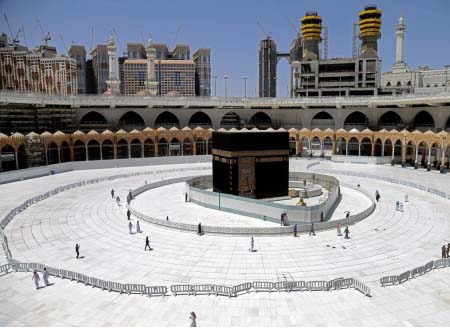
According to history, the hajj, which is cancelled this year is the 40th-time that a hajj has been cancelled. However, this year is exceptional as only residents of Saudi Arabia are performing the hajj
Amir of Mecca has officially announced the cancellation of the annual hajj pilgrimage this year because of the coronavirus pandemic.
Hajj is one of the largest religious gatherings in the world as hajj draws about 2 million people to Saudi Arabia each year.
However, following the postponement of other major events like the Tokyo 2020 Olympics, Saudi officials have faced pressure to cancel this year’s hajj to help curb the spread of the coronavirus.
This year’s hajj is supposed to take place from July 29 to Aug. 4, but Saudi Arabia is yet to lift an international travel ban implemented on May 20. Other countries have already declined to send pilgrims this year.
A cancellation of the hajj could put further economic pressure on a country still reeling from the drop in oil demand brought upon by the pandemic. Those making the pilgrimage were expected to generate $12 billion for the kingdom.
Ironically, Saudi Arabia has announced that the tourism sector will be completely restored across the country from 21st June.
The Saudi Minister of Tourism Ahmed Al-Khatib said that the tourism sector would be fully restored across the country but the tourism sector in Makkah would be banned.
He said that such a long ban on the sector had jeopardized the employment of people associated with the tourism sector. It should be noted that tourism in Saudi Arabia is a sector whose employees constitute 12 percent of the total employment and 13 percent of the gross national product of the Arab countries is also derived from tourism.
Carmatians, epidemics, and insecurity disrupt hajj for 40 seasons
Islamic historians say that the pilgrimage stopped 40 times, due to events and disasters that accompanied the seasons that caused it to be stopped: the spread of diseases and epidemics, political turmoil and security instability, extreme costly and economic turmoil, as well as road corruption before thieves and strips.This pause opened the door for questioning, and made many people wonder whether is it permissible to legally delay the hajj season for reasons that prevent its completion? .. The answer of the Muslim scholars came according to the book and the Sunnah, indicating that the ruling of the hajj is obligatory for every sane adult Muslim with the condition of physical or financial ability, stressing that everyone who is physically or financially unable to do so and does not have the cost of hajj is not required to do so. The duty until its availability, and they emphasised that the duty may not be suspended except for major reasons that prevent it from being completed, such as a loss of security or an epidemic in Makkah Al-Mukarramah, stressing the importance of jurisprudence of arranging intentions, in that self-preservation is provided at the risk of going on a pilgrimage.
Disrupting the hajj
Islamic history confirms that, since the ninth year of migration (the year the pilgrimage was imposed on people), the obligatory prayer has been suspended for about 40 times, and the first reason was caused by the Carmatians, so Al-Dhahabi says in his book “History of Islam,” specifically in volume (23), page (374), that in the events of the 316 Hijri year, “No one did Hajj this year for fear of the Carmatians”, because the Carmatians believed that the rituals of Hajj were among the rites of pre-Islamic times. It is like worshiping idols.
Carmatian swords
At this time, Abu Taher Al-Qarmati stood, chanting at the door of the Kaaba on the eighth of Dhu al-Hijjah in the year 317 AH, calling on the swords of his followers to reap the pilgrims of the house of God by killing, looting and shedding, at a time when he himself was supervising this appalling massacre and calling on his companions. Disbelievers and slave-worshipers, tore the corners of the Kaaba, and took off the Black Stone. "On the day the pilgrims hung on the curtain of the Kaaba and sought help from God, so the swords of this tyrant kidnapped them from every side, and their clean blood and their forbidden bodies mixed with the curtain of the Kaaba, until a number of about 30,000 people were killed in this massacre, and they were buried in their places without washing, shroud, or prayer.Black stone extraction The Carmatians also collected 3 thousand pilgrims' bodies, buried the Zamzam well and destroyed it in the college, then they took off the Black Stone from its place and carried them to the city of "Hajar" in Bahrain, where they were the center of their call and the capital of their state, and Abu Taher had built a house in which he called the House of Immigration. So, the black stone was placed on it for the pilgrimage to be disrupted to the Kaaba, and the people traveled to the city of "desertion".
Mashiri disease
The second incident is mentioned by Ibn Katheer in “The Beginning and the End,” and it dates back to the year 357 AH, and he says that Al-Mashari’s disease has spread in Makkah, so many creatures died, and in it Jamal Al-Hajij died on the way from thirst, and few of them arrived in Mecca, but rather died more than He arrived after Hajj.In the year 390 AH, the Egyptian pilgrimage was interrupted during the reign of Al-Aziz in God, the Fatimid, due to the high price. In the year 430, no pilgrims came from Iraq and Khorasan, nor from the people of Syria or Egypt.
Loss of security
In the events of the year 492 AH, Muslims suffered confusion and loss of security throughout their large state due to the rampant conflict between their kings, and five years before the fall of Jerusalem in the hands of the Crusaders, no one argued for the different sultans.As for the events of the year 563 AH, the Egyptians did not perform the pilgrimage because of their woe and preoccupation with the war of Asad Al-Din, and after that no one from other countries except the Hejaz from the year 654 to the year 658 AH.In 1213 AH, hajj trips were halted during the French campaign due to the insecurity of the road.
Sources
* Ibn Katheer book, the beginning and the end* Golden in the book of the history of Islam volume 22 page 374
* Abu Muzaffar in the mirror of time* History of Islam, volume 39, page 11, in events of the year 563





